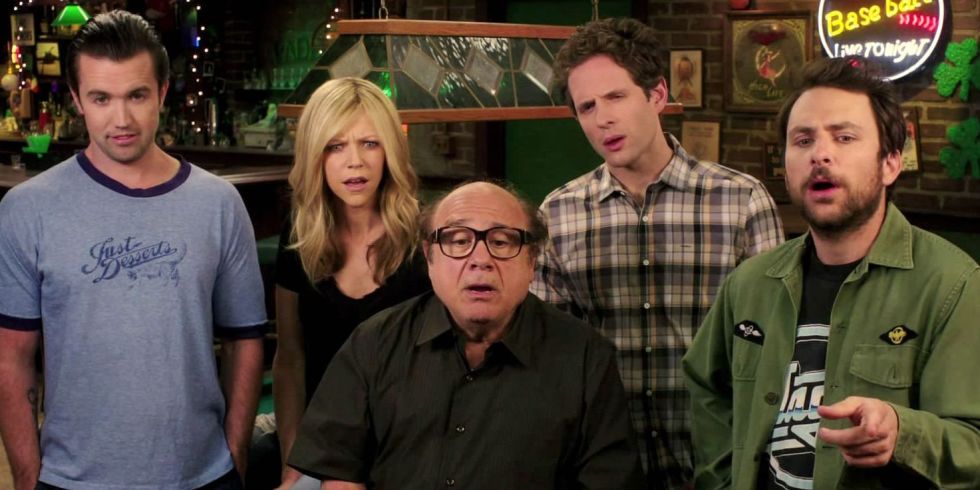There’s No Excuse for It’s Always Sunny in Philadelphia’s Terrible Writers’ Room Diversity in 2018
Or the decade-plus of seasons that preceded it.

Yesterday, Star Wars: Episode IX second unit director Vic Mahoney tweeted about how It’s Always Sunny in Philadelphia is going into its thirteen season, with 134 episodes total. Of those episodes, three were written by a woman and two by a person of color. That only happened in the last season, meaning that for most of the show’s run, the stories were written entirely by white men.
13 Seasons. ONE HUNDRED+THIRTY FOUR EPISODES since 2005.
&You all have somehow managed to hire;
1xWoman for 3 eps+1xPOC for 2 eps = 5 total.Both inclusive hires, occurred last year 2017. Meaning 12 Seasons of exclusion.
Congrats🧐 https://t.co/PIx3cDxMQx
— Vic Mahoney (@VictoriaMahoney) August 22, 2018
That number is, sadly, similar to Doctor Who‘s writer stats, where only eight episodes have been written by women and none by people of color prior to the coming season. A study released last year showed that only 4.8% of television writers are black; less than 6% of showrunners in the 2016-2017 season were black. A majority of writers’ rooms helmed by white showrunners only employed white writers.
There is a diversity problem behind the scenes of television, and that extends across the board. If we are not getting representation behind the scenes, it’s harder to get representation in front of the screens. Atlanta writer Stefani Robinson sums it up neatly in her article for The Guardian, saying:
So let’s talk about opportunities for a moment. Black showrunners are hiring black writers, sure. But what about white showrunners (the majority of showrunners)? Why aren’t they hiring minorities to write on their shows? I don’t know. Something that I hear a lot from white writers is that they like to “write what they know”. In my experience, this also means “I’m white so I only know and want to write white things. I don’t want to write about minorities because I won’t do them justice.” And that’s fair. I actually agree with the whole “write what you know”. But I genuinely believe that for a good portion of white writers, “write what you know” is just an excuse not to explore something outside of themselves.
You’re telling me that you have no problem writing shows with goddamn dragons and vampires and political coups and aliens but when it comes to creating black characters/narratives (AKA creating spaces and opportunities for black TV writers) you’re all like. “I’m just going to stick to my personal experiences”. It’s ridiculous to pride yourself on your imagination and then suddenly lose your imagination when it comes to creating a diverse writers’ room.
Robinson’s words are an indictment of the fact that writers are not getting opportunities because white showrunners are more likely to consider white writers for their series. The entire lesson of 2017-2018 is that films with diversity in front of AND behind the camera do well—Get Out, Wonder Woman, Girls Trip, Black Panther, and Crazy Rich Asians all prove that point over and over again, both in critical acclaim and with box office gold.
There’s also the simple fact that this is 2018, and we should not still be having this conversation. Let’s do the time warp and look at the Star Trek franchise; 22% of the Original Series was written by female writers. None of the televised entries into the franchise have had less than 17% of their episodes written or conceptualized by women. If they could have (admittedly all white) female writers in the sixties, we can have gender and racial parity in 2018. There is genuinely no excuse at this point in time.
These writers exist. They just don’t get the same chances that white, male writers do, and without more experiences in the writers’ room, we get mishaps like the consistently bad handling of race in The Handmaid’s Tale. This also means having more than just token representation in the room, as well; we need diversity of experience, not one person speaking up as the representation for an entire community.
Find diverse writers. Nurture their careers and hire them. If we want a more inclusive television landscape, we need to first have an inclusive landscape for writers to start their careers and tell their stories. Without that, we’ll see the same five characters on television over and over, with no growth or evolution. Representation matters across the board. Let’s see that begin to flourish off-screen as well.
(image: Shutterstock)
Want more stories like this? Become a subscriber and support the site!
—The Mary Sue has a strict comment policy that forbids, but is not limited to, personal insults toward anyone, hate speech, and trolling.—
Have a tip we should know? tips@themarysue.com